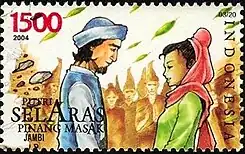| Ahkmad Barus II | |
|---|---|
| Datuk Paduko Berhalo | |
 Datuk Paduko Berhalo and Putri Selaras Pinang Masak, on a 2004 postage stamp | |
| 1st Raja of Jambi | |
| Reign | 1460–1480 |
| Successor | Sayyid Ibrahim |
| Born | Ottoman Empire (present day Turkey) |
| Died | Berhala Island, Jambi (present day Riau Islands)[1] |
| Spouse | Putri Selaras Pinang Masak |
| Issue |
|
| Religion | Islam |

Tuanku Ahmad Salim or Ahkmad Barus II, commonly known by his Turkish title of Datuk Paduko Berhalo,[2] was the founder and first king of the Kingdom of Jambi, he came from the Ottoman Empire, now Turkey.[3][4] He ruled from 1460 to 1480, with his wife, Putri Selaras Pinang Masak.[5][6] In the Malay community of Jambi, he has become part of the communal memory and mythology.[7]
Reign (1460-1480)
Different sources stated that his name is either Tuanku Ahmad Salim (a Gujarati)[8] or Ahkmad Barus II (a Turkish sultan's son, thought that the he was spreading Islam through his travels, but he ended himself stuck on the island).[9] He took the title Datuk Paduko Berhalo and established a new administration.[8] In Jambi, he eventually wed Putri Salaro Pinang Masak (a royalty from Pagaruyung),[10][9] who lives in Ujung Jabung.[2] In 1460 AD, Datuk Paduko reigned as Berhalo.[8]
Up to that point, they both led the Malay Peninsula to its current state. The people of Jambi refer to the two as Orang Kayo Pingai (Sayyid Ibrahim),[11] Orang Kayo Kadataran, Orang Kayo Hitam, and Orang Kayo Gemuk. Even though Paduka Berhalo married a queen from the Sumatra mainland, it is reported that he still makes frequent trips to the island.[9]
After Adityawarman passed away in 1375 AD, the Pagaruyung Kingdom started to vanish from history. The Kingdom of Jambi was founded up until that point. In the dispute with the Srivijaya kingdom, neither the Kingdom of Jambi nor the Malay Kingdom of Jambi are connected to the government of Datuk Paduko Berhalo, Orang Kayo Hitam or Sultan Thaha. Buddhists also attribute the fall of the Jambi Malay Kingdom, also known as the Jambi Kingdom, to the existence of temples in Muara Jambi. Orang Kayo Hitam, who lead the Kingdom of Jambi under Datuk Paduko Berhalo, are Muslims, nevertheless.[8] It was rumored that Hantu Island became Berhalo Island during his rule.[12]
On the island in the archipelago where he ultimately passed away.[9] Orang Kayo Pingai took over as head of the Jambi Sultanate after his death. The burial of Puteri Tun Pinang Masak lay in the Kumpeh region.[10]
Tomb
One of Berhala Island's eight cultural heritage sites is the Tomb of Datuk Paduko Berhala.[2] The mausoleum, Tomb of Datuk Paduka Berhala, is situated apart from the residential complex on a hill that is around 10 metres (33 ft) high. The mausoleum is situated in the southern region, close to the residential area. It is officially the property of the Regency Government on the Riau Islands. The Tomb of Datuk Paduka Berhala is one of the graves located there.[9]
References
- ↑ Potensi Arkeologis dan Sejarah di Pulau Berhala Pada kemdikbud.go.id 22 Agustus 2016
- 1 2 3 Suratno, Nanang (2023-05-08). "Makam Datuk Paduko Berhalo Salah Satu Ikon yang Ditetapkan BPCB Sumatera Barat". Metro Jambi (in Indonesian). Retrieved 2024-01-03.
- ↑ Melirik Kisah Datuk Paduka Berhalo sampai ke Pulau Berhala Pada tribunnews.com 21 Oktober 2011
- ↑ Tiga Kerajaan Islam di Sumatra Pada republika.co.id 6 Maret 2017
- ↑ Datuk Paduka Berhala Pangeran Turki Yang Mengislamkan Jambi Pada historyofcirebon 16 Oktober 2018
- ↑ Datuk Paduka Berhala, Anak Raja Turki yang Persunting Putri Pinang Masak Pada melayupedia.com 30 Desember 2021
- ↑ "Perjalanan Betuah (47)". bungotoday.com (in Indonesian). 2020-12-02. Retrieved 2024-01-03.
- 1 2 3 4 "Datuk Paduko Berhalo (1)". Pariwarajambi.com (in Indonesian). 2021-04-20. Retrieved 2024-01-03.
- 1 2 3 4 5 "Kisah Datuk Paduka Berhala, Anak Raja Turki yang Persunting Putri Pinang Masak - melayupedia.com". www.melayupedia.com (in Indonesian). Retrieved 2024-01-03.
- 1 2 Ikhwan, Mhd; Anggela, Foni Refika (2019-06-01). "MAKAM LEGENDA ORANG KAYO HITAM: SEBUAH ANALISIS HISTORIS". Nazharat: Jurnal Kebudayaan. 25 (1): 53–63. doi:10.30631/nazharat.v25i1.17. ISSN 2541-2183.
- ↑ "Miris, Situs Makam keturunan Raja Jambi Terbengkalai". Halo Jambi (in Indonesian). 2020-08-30. Retrieved 2024-01-03.
- ↑ "Jejak Pulau Hantu dan Ahmad Barus II (Bagian 1)". Arah Baru Negeri Jambi (in Indonesian). 2020-02-17. Retrieved 2024-01-03.